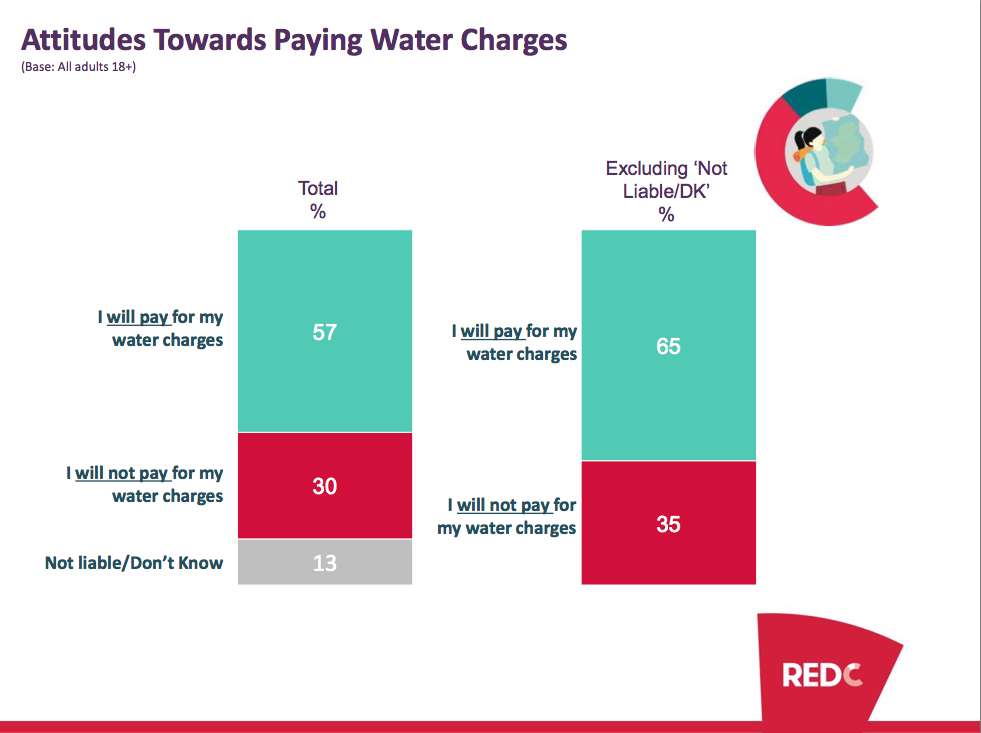
Question: How do you spoil the positive impact of the first non-austerity budget in years? Answer: Start the process of charging people for water at pretty much the same time, and then make a pig’s ear of managing a series of negative PR issues regarding its implementation and the costs of its administration.
During the austerity years the Irish public often moaned about their circumstances, but never to the extant that they physically rebelled about it. Now however, the anger at the introduction of water charges is palpable, and it is no surprise
to see that a sizable proportion of the public are adamant that they do not intend to pay the charges.
Over a third of those that express an opinion (35%) told us that they will not pay the charges, once those not liable for the charges and those who are undecided are excluded. Those most likely to say they will not pay are Sinn Fein supporters, with 68% rebelling against the charges. Likelihood to pay also increases with age. Well over half of all 18-24 year olds (58%) state that they do not intend to pay and this proportion declines at regular intervals down to just 23% of those aged 65+.
Do not however be mistaken by assuming that those who are rebelling are all from more working class backgrounds. Almost 2 in 5 (38%) of those in more downmarket social groups do state they won’t pay, but at the same time just under a third (31%) of those in more upmarket social groups also state that they won’t pay. Even 1 in 10 (9%) Fine Gael voters suggest they won’t pay the charges.
We asked a similar question with regard to the introduction of the property tax back in 2013, and at that time 29% of voters suggested they would not pay. This rebellion is therefore definitely stronger, but not considerably so. The crucial difference of course is that the property tax cannot be avoided, with the Revenue’s ability to collect tax through payroll, whereas it will be far more difficult to enforce payment of water charges.
While originally the government parties may have hoped for a post budget bounce, with the economy clearly in growth, this has been turned on its head with water charges dominating the media. Add to that the anger among younger first time buyers with regard to the 20% deposit, and you have a series of events that have meant what should have a winning budget for the government has been overshadowed.
Support for Fine Gael, rather than improving, is as a result down 2% in today’s poll, leaving the party securing 26% share. Sinn Fein should have benefited and may well have done initially. However, allegations this week from Mairia Cahill that she was raped by a member of the IRA when just 16, and that the IRA set up a Kangaroo Court rather than reporting the matter, has heaped pressure on Sinn Fein and its leader Gerry Adams. The result is to knock the party back from the highs they achieved in the last poll, with support down 3% to leave them securing 20% first preference vote.
That Fianna Fail has not benefitted from their opposition to water charges, amidst all this turmoil for Fine Gael and Sinn Fein, will be of some concern. The party appears to be stranded at 18% share of the vote. Labour are also too close to the water charges to benefit, but at least they don’t fall back any further, and do retain the 8% share, but with no bounce from the budget.
Instead voters move to the only option left to them, having shied away from a Fine Gael government that is introducing the water charge, a Sinn Fein party being associated with covering up rape cases, and a Fianna Fail party still blighted by bringing the country into an era of austerity – that is to deliver support to Independent candidates and other parties. For the first time we see 1% support nationwide for both the Anti-Austerity Party and People Before Profit, while support for Independent candidates also increases.
In years gone by at this stage of an electoral cycle we may have seen these voters move towards being “undecided”, but it is clear that the negatives pushing them away from established parties are strong enough that they want to support someone in opposition rather than remain undecided. Surely an opportunity for that “new political party” we keep hearing about?
Download full report below:
SBP 26th October 2014 Poll Report